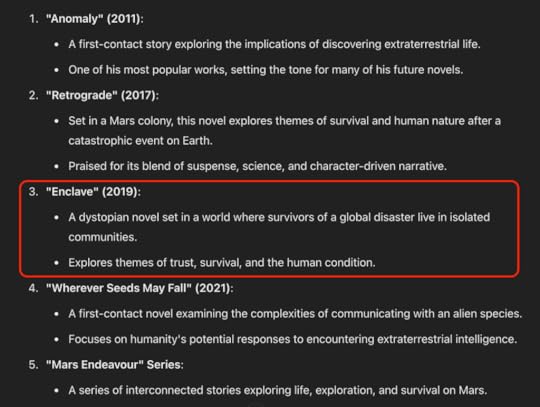The Danger of Artificial Intelligence
Whether it’s Grok, ChatGPT or Llama by Meta, AI is advancing at a rapid pace, and US President Donald Trump is throwing hundreds of billions of dollars at the technology to ensure America remains the world leader in AI.
The problem is that AI is getting so good that it’s nigh on impossible to spot when it’s wrong—and it is wrong a lot of the time, producing what are called “hallucinations” where it confidently presents fabricated information as though it were fact. Take, for example, this output from ChatGPT 4, where I asked it to provide an overview of my novels.

The first thing to note is that it did not list all of my books, which can be easily found on Amazon and Goodreads and in plenty of other places.
The second is that it fabricated a lie. And it did it with the utmost confidence. I haven’t written a novel called Enclave.
And it gets worse… when I started asking it about the novel Enclave, ChatGPT provided me with a five-page summary of the plot, major themes, characters, writing style and how it was received by critics.
And the book simply does not exist. It’s a complete hallucination!
Forget about SkyNet and the Terminator, this is the real danger of AI—it blurs the line between fact and fiction, between reality and fantasy.

In which other field would a 20% failure rate be acceptable?
No one would fly on a plane that crashed every 5th flight. No one would buy pizza from a restaurant where you regularly got food poisoning. AI is not fit for purpose. It shouldn’t be broadly in use and yet it is being rolled out everywhere. Even knowing that there are hallucinations is not good enough, as it’s impossible to tell which 20% is wrong. If a plane crashes, it’s clear to see there is a problem, but ChatGPT gives no clues as to when it is hallucinating. Its confidence in creating illusions is worthy of a magic show on Broadway.
We live in a post-truth world. Misinformation is an astonishing problem in the modern world. We’ve gone from the Information Age in the late 90s to the Misinformation Age, where lies convinced the UK to leave the EU, and the US elected a known felon as President instead of sending him to jail.
And now we have AI spreading random misinformation as though it were true. Fact is being blended with fiction and sold as truth—and that should alarm everyone.
We need to stop calling it Artificial Intelligence. It’s not intelligent. It is a blind aggregator of information with no regard for its veracity. To its credit, Grok provides links to its sources, so there is some hope for the integrity of the information, but this assumes the sources are credible. It would be a significant step forward if other AI platforms adopted a similar strategy. In the meantime, don’t assume AI is correct. That’s a dangerous position to take.



